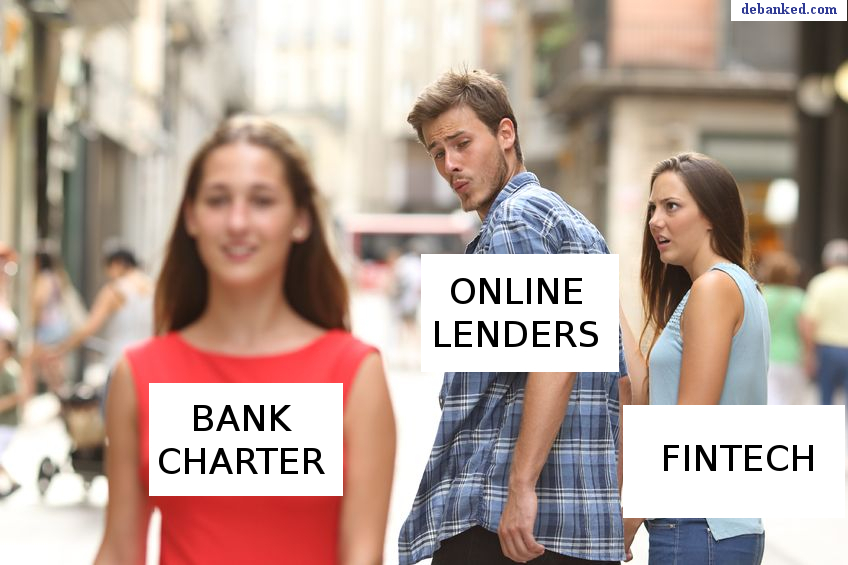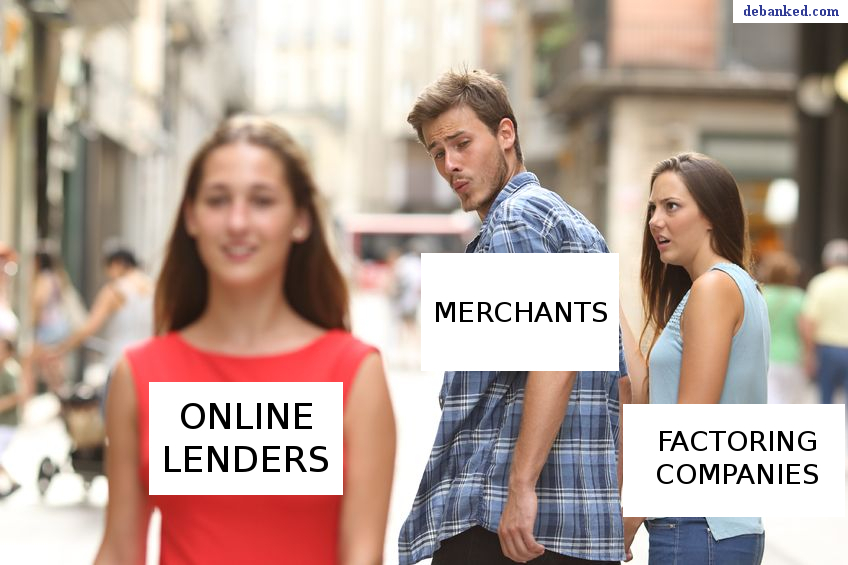Archive for 2017
Square Wants to Become a Bank
September 6, 2017 Square is expected to apply for an Industrial Loan Company (ILC) bank charter this week, according to American Banker and other sources. Like SoFi, who is busy trying to do the same thing, their attempt will also face competitive resistance.
Square is expected to apply for an Industrial Loan Company (ILC) bank charter this week, according to American Banker and other sources. Like SoFi, who is busy trying to do the same thing, their attempt will also face competitive resistance.
In June, Richard Hunt, president and CEO of the Consumer Bankers Association (CBA), told deBanked that in the case of SoFi, “The whole world is evolving, fintech is evolving. This was inevitable one way or another.” It is therefore not entirely surprising that Square is following SoFi. Others may wait to see how the regulatory debate plays out before putting in applications of their own, however.
“No one envisioned when they wrote the ILC charter that we would have fintech companies that finance mortgages and student loans from private equity capital and not deposits. It’s a new world. Like with all rules and regulations, federal regulators should periodically review longstanding policy,” Hunt said.
Several people from the banking industry argue that the ILC charter route is a loophole and that if fintech companies exploit it and screw up, they could put the entire banking system at risk.
Christopher Cole, executive vice president and senior regulatory counsel at the Independent Community Bankers of America (ICBA), previously said, “We have been fighting the ILC charter for over a decade. When Walmart tried to apply for an ILC charter in 2006 we objected at that point. And that resistance was part of the reason why they never got a charter.”
On August 25th, Congresswoman Maxine Waters requested that a hearing be held on ILC charters to weigh all the concerns before acting on new ILC applications.
Until then, just because Square wants to become a bank, doesn’t mean they will succeed in doing so.
No, Able is Not Going Out of Business, Company Says
September 5, 2017
An industry blog appears to have stretched the truth, again.
On September 1st, Lending Times published a story that relied on an anonymous source to suggest that Austin,TX-based Able Lending is going bankrupt and selling their portfolio. No other compelling evidence is offered other than Lending Times not having their messages returned. No clues as to what kind of knowledge the source might have and why they have it is provided.
Another blog piled on top of that story by circulating an email this afternoon with “Able Lending closing down?” in the subject line. That blog also wrote that their messages were not returned.
I personally reached out to Able and received an immediate response. Company CEO Will Davis pointed out a flaw with Lending Times’ anonymous source. “This anonymous source doesn’t seem to be anyone close to Able, because Able does not own a portfolio of loans (it originates and distributes loans to direct lenders, who then hold those loans on their balance sheet) and therefore has no portfolio to sell,” he said.
Davis also speculated that there could be an ulterior motive. “We believe this story originated by the fact that we’ve been in active discussions with a number of originators to acquire Able, and there’s a non-zero chance this story was placed in order to throw an interested party off the trail,” he explained.
“In any event, we have no plans to go out of business and no plans to declare bankruptcy,” he concluded.
Ascentium Capital Successfully Hosts CLFP Exam and Prepares for its Largest Sales Training Event
September 5, 2017September 5, 2017 KINGWOOD, TX – Ascentium Capital LLC, the top private independent finance company in the United States by new business volume, proudly hosted an Academy for Lease and Finance Professionals (ALFP) in Dover, New Hampshire.
The ALFP is an intensive three-day event designed to prepare individuals for the Certified Lease and Finance Professional (CLFP) exam. The CLFP designation is considered a preeminent credential throughout the world. This event resulted in seven new certified leasing professionals. “Ascentium Capital currently employs 17 CLFP-designated professionals and we are proud to support the industry and the advancement of financing professionals,” states Bob Fisher, CLFP and senior vice president of business development at Ascentium Capital.
Ascentium Capital also reached a new milestone and is holding its largest internal sales training program, Ascentium University this month. The Company will be on-boarding 10 new vendor focused sales representatives with course curriculum addressing business processes, marketing strategies, solution-based selling and the use of the award-winning technology platform. The mission is to lay the foundation for achievement and shorten the ramp-up period for a faster impact on growth. Richard Baccaro, chief sales and marketing officer at Ascentium Capital comments, “We are committed to the investment of our most powerful resource, our employees. Ascentium University enables us to attract top sales talent and to ensure they are set up to succeed.”
The Company’s growth continues in key industries including construction, healthcare, hospitality, technology and waste management. Due to this, recruitment efforts cover a national footprint. Ascentium Capital currently employs 105 sales representatives throughout the United States.
About Ascentium Capital
As a direct lender, Ascentium Capital LLC specializes in providing a broad range of financing, leasing and small business loans. The company’s offering benefits equipment manufacturers and distributors as well as direct to businesses nationwide. Ascentium Capital is backed by the strength of leading investment firm Warburg Pincus LLC. For more information, please visit
AscentiumCapital.com.
Media Contact
Monica Bruegl
SVP Marketing
Ascentium Capital LLC
MonicaBruegl@AscentiumCapital.com
Former Chief Sales Officer of OnDeck Joins CoverWallet as COO
September 5, 2017Paul Rosen, the former Chief Sales Officer of OnDeck, is now the Chief Operating Officer of CoverWallet, according to LinkedIn. Rosen worked at OnDeck from May 2011 to June 2017. CoverWallet is part of the growing insurtech (insurance technology) industry, helping business owners manage “all [their] policies online, all in one place.” The company was named Best Insurtech Solution at 2017 Benzinga global FinTech Awards.
You’re Under Arrest: Funder Takes Extreme Measures to Counter Data Theft
September 4, 2017
An employee of Yellowstone Capital was arrested last month, according to a source who witnessed the events. At the company’s behest, local police entered Yellowstone’s Jersey City office and handcuffed a female employee who was believed to be engaged in the theft and misappropriation of financial data.
A spokesperson for Yellowstone would not comment on the events nor release the name of the accused. deBanked nevertheless obtained a photo of the individual being escorted out by police. We’ve blurred out her face to protect her identity. Several of those present, who spoke on the condition of anonymity, said that she had been employed by the company for several years.
When asked more generally about the risks of data leakage in the industry, Yellowstone Capital CEO Isaac Stern said that his company is operating on the edge of hyper vigilance. “Yellowstone is investing tons of time, money, and effort to prevent data theft,” Stern said. “We are doing everything in our power, everything, to address it, and we have even enlisted the assistance of an outside security firm.”
The incident does not stand alone. Last year, a man on Long Island pled guilty to attempted criminal possession of computer related material after being implicated in a merchant cash advance backdooring scheme.
Backdooring is industry jargon for when a broker submits a potential deal to a funder and that file ultimately leaks out to third parties whom the broker did not authorize to handle the information. Often times brokers will point their fingers at the funder for mismanaging data they suspect is escaping out the back door. Such accusations can be detrimental to a funder’s reputation not only with the broker community but also with customers they advance funds to. That’s why some funders are taking data security to new levels.
Greenbox Capital, for example, a funder in Miami, FL told deBanked back in March that their company designed proprietary software to monitor the actions of all users on their system, which allows them to know who clicked on what when, and for how long. They also developed algorithms to detect suspicious behavior and their security team receives an alert whenever it gets triggered. Greenbox had initially conducted a 90-day probe and discovered that two employees were stealing data. They don’t want that to ever repeat itself.
Using a cell phone to take pictures of confidential data may not help rogue employees evade detection, according to several funders who have said there are methodologies to spot this behavior but declined to explain what they are. And the risk of getting caught may not merely be termination, as evidenced by arrests that have taken place thus far. These funders say there have been other arrests over the last few years but that the companies did not want to draw attention to them.
Indeed, of the two backdooring-related arrests deBanked has reported on now, neither would officially confirm them.
“We take ISO information extremely serious,” Yellowstone’s Stern explained, lamenting that the value of deal data can inevitably foster rogue behavior, which they are constantly monitoring for.
Put another way, the personal information of a single performing client could be worth as much as $10,000 or more if it gets into the wrong hands. That’s because it could be used to offer that client a loan, advance or other service. The profit could come in the form of a commission, interest, RTR, a closing fee, or even something more nefarious like stealing their identity.
“We know about the pressure people face to illegally transmit data,” Stern said. “They think we don’t know, but we know the industry. Ultimately we will catch you.”
The State of The Industry (In Memes)
September 2, 2017The state of things in MCA, online lending, and fintech through the disloyal boyfriend meme:












SEE MANY MORE DEBANKED MEMES
The History of Alternative Finance (As Told Through Memes)
Ready to Trade ONDK and LC? Scroll to the bottom of the page
10 Clues You’re Hardcore About Merchant Cash Advance
Yellowstone Capital Has Record Month
September 1, 2017Yellowstone Capital had a “record smashing August,” according to a post on Instagram. They originated 1729 deals for a total of $55.5 million. The top rep recorded 161 deals for $4.62 million. Juan Monegro, who was previously interviewed by deBanked, originated 202 deals for $3.7 million.
Marketplace Lending Investors Ponder Loan Defaults, Issues in Harvey’s Path
September 1, 2017On the LendAcademy Forum, a Lending Club investor posted that he had been selling notes belonging to Houston borrowers in anticipation of payment issues stemming from Hurricane Harvey. Other users chimed in with assessments of their own personal exposure, including one who noticed that affected zip codes made up a little under 4% of his outstanding principal. By now, secondary note buyers probably have their radar up to heed caution with these.
Elsewhere in the industry, MCA firm Strategic Funding and lender Breakout Capital both announced that they were suspending debits to businesses they’ve funded in the Hurricane’s path.
A message for our customers located in flood-affected areas of Texas pic.twitter.com/4nc8bjWzg5
— Strategic Funding (@SFSCapital) August 28, 2017
The OCC is also advocating that banks suspend payments in those areas from ATM fees to loans. They should consider “restructuring borrowers’ debt obligations, when appropriate, by altering or adjusting payment terms. Payment extensions should reflect individual borrower situations and generally should not exceed 90 days,” according to a statement.





























